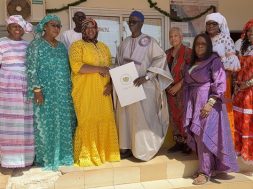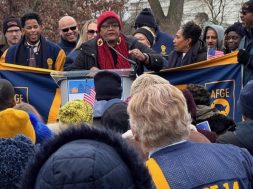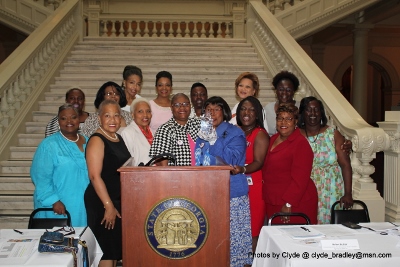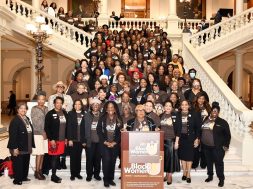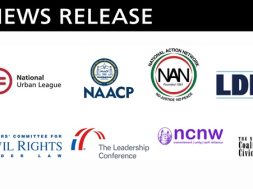
Black Women Leaders Come Together to Determine Key Issues to Mobilize Around for the Midterm Election in Georgia
Atlanta, GA – An intergenerational group of Black women leaders from ten Georgia counties convened at the Georgia Capitol today to be briefed on findings from the Black Women’s Roundtable Public Policy Network (BWR) report, Black Women in the U.S., 2014, and their factsheet, The Status of Black Women in Georgia. The presentation was followed by a BWR roundtable discussion to focus women on utilizing key findings from the report to engage, motivate and mobilize black women for the Midterm Election in Georgia.
“Today is the beginning of a series of BWR Power of the Sister Vote Organizing Roundtables we plan to host in states to engage Black women across the country,” said Melanie L. Campbell, president and CEO National Coalition and convener, BWR. “Black women are a powerhouse in Georgia so it’s only natural that we would kick off in Atlanta,” Campbell said as she presented the report to Georgia State Representative Dee Dawkins-Haigler.
“When Black women get together they get it done,” said Rep. Dawkins-Haigler, chair of the Georgia Legislative Black Caucus (GLBC), cohost of the briefing. “We’re going to get ourselves together and get to the promised land.”
The BWR Report looks at tragedies and the triumphs surrounding Black Women’s lives across a variety of different indicators and areas of inquiry. The report and local factsheet found that significant progress has been made for Black women since key historical markers, however, there are many areas that remain in need of dire national attention and urgent action. Areas covered in the report include: education, economy, retirement security, labor unions, criminal justice, entrepreneurship, politics, and What’s at Stake in the 2014 Election.
“The Census verified that Black women outvoted every other demographic in 2012. Given that fact, where do we stand? This report gives a quick glimpse at where Black women are today- it’s an organizing tool,” said Campbell. “Black women are a powerful political force and we plan to demonstrate that power by working collaboratively and intentionally across issues to usher in a new set of progressive polices and leaders to champion our cause.”
small_group1 “Georgia Secretary of States office reports that African American women are the majority registered voters in 147 Georgia cities, 27 counties and 4 congressional districts; yet African American women make $0.62 for every dollar a white male makes and twenty-nine percent (29%) of African American women and girls live in poverty in Georgia.” said Helen Butler, convener, BWR GA and executive director of The Coalition for the Peoples’ Agenda. “The issues in these reports speak to Black women who vote. Our job is to get the information to them so they know where we stand and understand the power they have if they get their families to the polls.”
President of Women Flying High, Rita Jackson Samuels adds, “Georgia reflects the good and bad for Black women owned businesses. The good is that in Georgia, Black women own 34% of women-owned firms, that’s 21% higher than the national average.” Jackson Samuels continues, “The Bad is the fact that the state ranks first in the growth in women owned firms, it ranks 21st in revenue, the lowest among the top ten states with the largest growth in women business ownership.”
Felicia Davis, director, Building Green Initiative at Clark Atlanta University pointed out, “It’s a positive that Black women are getting educated and getting better jobs, however, because Black women are more likely to be taking care of family and friends, the US Census reports that single black women have the lowest net worth among all racial and gender groups. The net worth of single white women is $41,500, single white men is $43,800. Black women have a net worth of $100, That’s $100. We have work to do.”
Representative Dee Dawkins-Haigler added that the GLBC will host a series of symposiums across the state to educate women on salient issues that highlight the disparities in African American communities. “This initiative allows policy-makers an opportunity to dialogue with key industry experts and provide information to enhance the quality of life for Black women and their families. Additionally, the GLBC has embarked on a statewide campaign to mobilize communities, specifically targeting Black women, on the importance of voting and the power their vote holds.”
Women participating in briefing included: Commissioner Janie Reid, president Black County Commissioners; GA State Senator Gloria S Butler, vice chair GLBC; Deborah Scott, executive director, Georgia Stand Up; Mayor Evelyn Dixon, Riverdale, GA; GA State Rep. Shelia Jones; and GA Rep. Sandra Scott. The roundtable discussion was co-hosted by: The Coalition for the Peoples’ Agenda, Georgia Coalition of Black Women, Georgia Legislative Black Caucus, 9 to 5 Atlanta, Georgia Stand Up, and the National Coalition on Black Civic Participation.
BWR, an intergenerational women’s policy network of the National Coalition on Black Civic Participation (NCBCP), stays at the forefront of championing just and equitable public policy on behalf of Black women and girls and promotes health and wellness, economic security, education and global empowerment as key elements for success. For more information or a copy of the report visit www.ncbcp.org.

